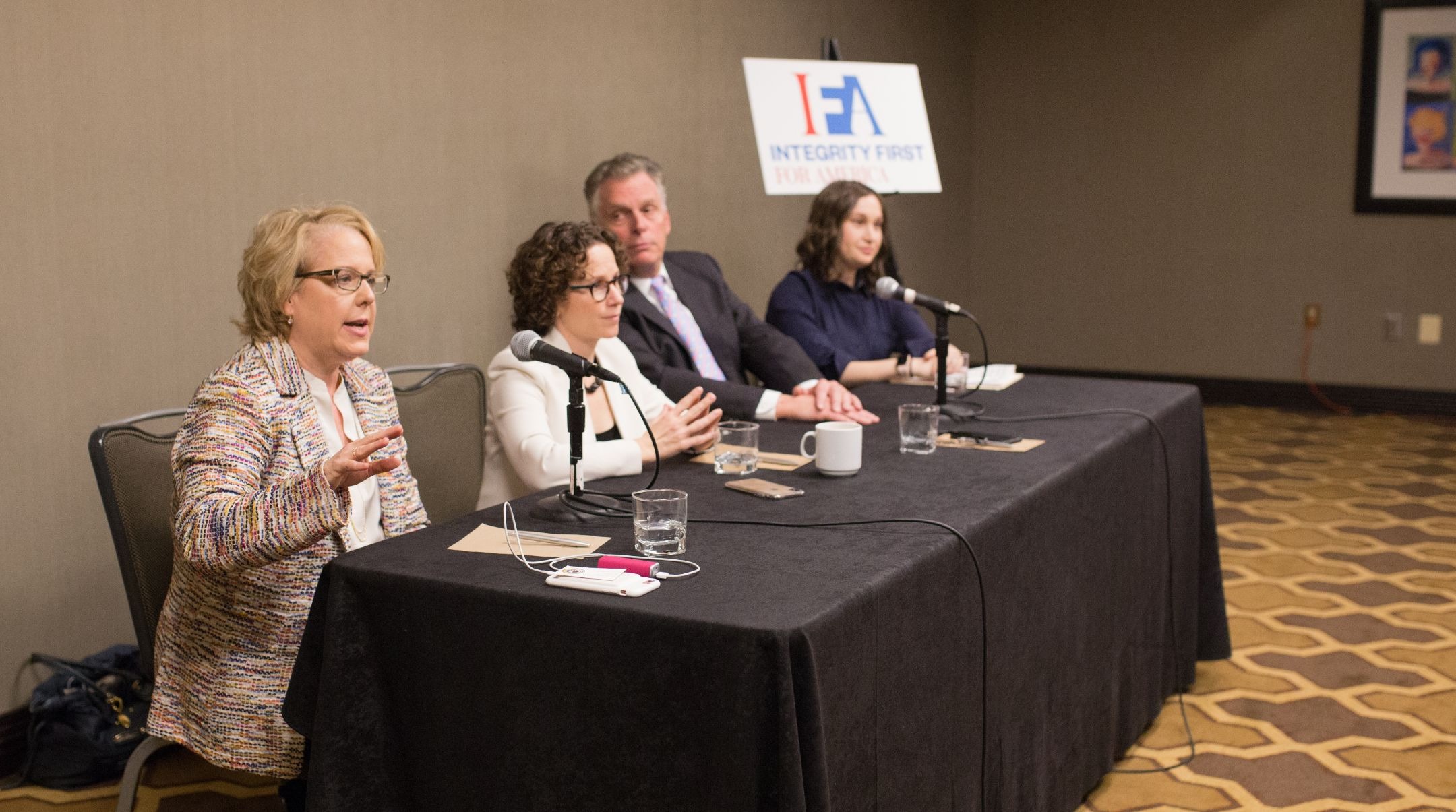WASHINGTON (JTA) — It’s not the speech, it’s the conspiracy.
Roberta Kaplan, the lead counsel on one case that changed U.S. history — upholding the rights of same-sex spouses — wants to make history again and scare white nationalists intent on violence into thinking again.
Government efforts to confront the rise of white supremacism have been inhibited over the last decade by free speech considerations: However vile the expressions of people who express hatred toward Jews, blacks and other minorities, the argument goes, the expressions are speech protected under the First Amendment.
Free speech protections are why the American Civil Liberties Union stepped in ahead of the Aug. 12, 2017, neo-Nazi march in Charlottesville and sued on behalf of the marchers to assemble at their preferred venue, a park in the center of the Virginia university town.
The march turned deadly. Kaplan, reviewing the evidence in its aftermath, saw in online conversations between the organizers not speech, but a conspiracy to commit deadly violence.
“They intended for violence to happen, it did happen and they celebrated it,” Kaplan told the Jewish Telegraphic Agency in a recent interview. “I think it is important for Americans to hear what these men and groups did, what they intended to do, how they celebrated and what a grave threat to our system they are.”

White supremacist leader Richard Spencer, center, and supporters clash with police after the “Unite the Right” rally in Charlottesville, Va., was declared unlawful, Aug. 12, 2017. (Chip Somodevilla/Getty Images)
Kaplan and another lawyer, Karen Dunn, are leading a team that has sued 25 of the alleged organizers of the Charlottesville violence under post-Civil War statutes that cracked down on Ku Klux Klan terrorism in the South aimed at keeping blacks from exercising their newly acquired civil rights. A 1983 amendment to the Ku Klux Klan Act, an 1871 law, allows victims of the terrorism to sue for monetary compensation, not just the government.
Their suit, known as Sines v. Kessler, essentially says the defendants used websites and other social media not just to share protected free speech, but to coordinate and plan the racially motivated violence that occurred at the “Unite the Right” rally in Charlottesville.
“The Defendants in our case used various forms of social media to coordinate their illegal conspiracy to commit racialized violence in Charlottesville in August 2017,” Kaplan said in a statement in February after a judge said Twitter and other platforms must turn over material.
A nongovernmental organization has raised $10 million toward paying the costs, an official of the group told JTA, and is still fund-raising. Integrity First for America, according to its website, is “dedicated to holding those accountable who threaten longstanding principles of our democracy — including our country’s commitment to civil rights and equal justice.” But for now its only brief is the Charlottesville case.
Amy Spitalnick, the group’s executive director, in recent months has explained the lawsuit in Jewish forums, including to the Jewish Council for Public Affairs and the American Jewish Committee.

Roberta Kaplan, left, addresses a panel in Washington, D.C., about the case Integrity First for America is bringing against the organizers of the 2017 neo-Nazi march in Charlottesville, Va. From left, the rest of the panel is Kaplan’s co-counsel, Karen Dunn, former Virginia Gov. Terry McAuliffe and Integrity First Executive Director Amy Spitalnick. (IFA/Emily Goodstein)
Using subpoenas, Kaplan’s team has obtained reams of information. Although part of the legal work by a team of about 12 lawyers is pro bono, there are steep costs involved in sorting through the material and preparing incriminating statements for use throughout the process, as well as for security for the lawyers.
Spitalnick said the lawsuit was critical, especially because the government during the Trump administration has rolled back efforts to track and prevent white supremacist violence. (The Department of Justice has chosen not to sue the Charlottesville defendants under the same 1871 Klan law.)
“The infrastructure that’s meant to address this sort of thing has actively been dismantled,” Spitalnick said.
The point is not to make the 10 plaintiffs rich, Kaplan said. It’s to create a disincentive for anyone to carry out the violence again.
“One point of this case is to make it clear to anyone considering this, if you do that, there will be very large judgments against you that will follow you until they are paid,” she said, noting that it is unlikely plaintiffs will be able to collect, in part because some of the defendants are in hiding and others are broke. “Our hope is that will act as a deterrent for people to engage in organized racialized violence.”
Kaplan, Dunn and other lawyers involved very much want the case to come to trial and have the same impact as other high-profile cases. Kaplan cites the Scopes Monkey Trial of the 1920s, which turned into a national lesson on evolution, and the Proposition 8 case, that together with the lawsuit she took to the Supreme Court (and won in 2013) on behalf of a Jewish woman, Edie Windsor, helped turn American opinion around on gay marriage.
The 112-page complaint, which was filed in October 2017, reads less like a legal document and more like one of those book-length reconstructions of actual events, where the reader knows the awful outcome and still turns each page. (Norman Moon, the U.S. District Court judge considering the case, said in a separate filing that the complaint’s length is “pushing the limits” of federal requirements, but allowed it.)
The complaint, in spare language, forcefully makes the case that ideology and actions are inextricable.
“Defendants brought with them to Charlottesville the imagery of the Holocaust, of slavery, of Jim Crow and of fascism,” it says. “They also brought with them semi-automatic weapons, pistols, mace, rods, armor, shields and torches.”
The plaintiffs got a break when Unicorn Riot, an alternative media site, posted hacked exchanges between the plaintiffs on Discord, a chat site for gamers. Kaplan selected individual defendants based on evidence in the chat rooms of them organizing the violence in Charottesville.
“Everyone we sued as a defendant in the case was pretty involved in the intricate planning of what happened,” Kaplan said.
Among the 25 defendants are Jason Kessler, who with ACLU assistance secured the permit for the protest against plans to remove a statue of Confederate Gen. Robert E. Lee; Richard Spencer, who coined the term “alt-right” and founded a “think tank” propagating white nationalist ideas; Andrew Anglin, the publisher of the neo-Nazi site The Daily Stormer; and James Fields, who was sentenced to life in prison for the car-ramming attack that killed a counterprotester, Heather Heyer, and injured 20 others.
Also named are the white supremacist groups Identity Evropa, Traditional Worker’s Party, League of the South and iterations of the Ku Klux Klan whose members were present.
A range of channels Kessler and a colleague set up on Discord run from the practical (“lodging_wanted,” “shuttle_service_information”) to the ideological (“dixie-lyrics”) to the tactical (“gear_and_attire,” “safety_planning”).
On page 76 of the complaint, the plaintiffs note that a co-conspirator, identified only as Tyrone, in a channel called “virginia_laws” nearly a month before rally asks: “Is it legal to run over protesters blocking roadways? I’m NOT just shitposting. I would like clarification.” On page 77, it notes that on the day of the rally, “at approximately 1:40 pm, in furtherance of the conspiracy, Defendant Fields drove his Dodge Challenger onto Fourth Street, idled for a moment while his vehicle faced the peaceful protesters, and then deliberately accelerated into the crowd.”
Judge Moon has dismissed filings from multiple defendants who want the case dismissed on the basis of freedom of speech and gun rights. Spencer, filing for himself — he has said he could not find a lawyer willing to represent him — argued that the complaint weaves together “scattered” statements and acts and without foundation attaches to them “sinister motives.” He calls the complaint “lawfare,” the practice of using the courts to punish and silence a political opponent.
The 10 plaintiffs also were strategically chosen to represent the scope of the alleged targets. Among them are Rev. Seth Wispelwey, a pastor allegedly assaulted during the protests who has since suffered PTSD; Marcus Martin, an African-American man who was injured when he moved to push his fiance out of the way of Fields’ car; and Hannah Pearce, a member of the city’s Congregation Beth Israel, who allegedly was harassed, intimidated and assaulted during and after the event.
Kaplan said that she and her office staff watched Charlottesville unfold on folding chairs on Aug. 12, 2017 (she had just moved into new offices in the Empire State Building) and within days she was in the town seeking appropriate plaintiffs. That’s when she understood that the case could be best made under anti-conspiracy laws.
(Moon for now has dismissed the complaints filed by Pearce, the Jewish woman who was hit by a “foul liquid” and who wore a Star of David and a carried a rainbow flag while protesting against the neo-Nazi march. He has concluded that she, alone out of the 10 plaintiffs “has not sufficiently alleged her injuries were caused by overt acts committed in connection with Defendants’ conspiracy.”)
Kaplan said her Jewish identity drives her in this case, just like the Windsor ruling. She celebrated that victory with a sermon she delivered at her Manhattan synagogue, Congregation Beth Simchat Torah.
“It’s pretty hard to shock me, and the one thing that I found in this case to be really quite shocking is that while all these defendants hate blacks and LGBT, are not thrilled with Hispanics and women, the one element that is their raison d’etre is anti-Semitism,” she said.
Kaplan’s wife is related by marriage to Sigmund Warburg, the prominent German Jewish businessman who said dismissively of the Nazis in 1930, “once they are in government they will immediately become, first, more sensible and, secondly, once again less
popular.”
She said she is reminded constantly of Warburg and his unfounded certainties watching current events in the United States, including recent arson attacks on synagogues in Chicago and Boston.
“These are not one-off events,” she said. “It’s part of a much larger crisis of anti-Semitism and racism and violent hate.”
JTA has documented Jewish history in real-time for over a century. Keep our journalism strong by joining us in supporting independent, award-winning reporting.






